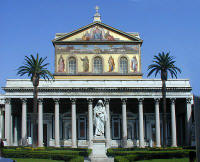 VISIT TO THE
ROMAN BASILICA OF ST PAUL-OUTSIDE-THE-WALLS
VISIT TO THE
ROMAN BASILICA OF ST PAUL-OUTSIDE-THE-WALLS
Homily of H.H. Benedict XVI
Monday,
April 25, 2005
Your Eminences,
Venerable Brothers in the Episcopate and in the Priesthood,
Dear Brothers and Sisters in the Lord,
I
give thanks to God who, at the beginning of my ministry as
Successor of Peter, has granted me to pause in prayer at the
Apostle Paul's tomb. It is a deeply-desired pilgrimage, an act
of faith that I am making not only in my own name but also in
the name of the beloved Diocese of Rome, of which the Lord has
constituted me Bishop and Pastor, and of the universal Church,
entrusted to my pastoral care.
It
is a pilgrimage, so to speak, to the roots of mission, the
mission that the Risen Christ entrusted to Peter, to the
Apostles and in a special way also to Paul, urging him to
proclaim the Gospel to the Gentiles, so that he came as far as
this city where, after preaching the Kingdom of God for some
time (cf. Acts 28: 31), he poured out his blood, bearing the
extreme witness to his Lord who had "grasped" him (Phil 3: 12)
and sent him forth.
Even
before Providence led him to Rome, the Apostle wrote his most
important Letter, from a doctrinal point of view, to the
Christians of this city, the capital of the Empire. The first
part of it has just been proclaimed, a closely packed
introduction in which the Apostle greets the community of Rome,
introducing himself as a "servant of Christ Jesus, called to be
an apostle" (Rom 1: 1). A little further on he adds: "Through
him [Christ] we have been favoured with apostleship, that we may
spread his name and bring to obedient faith all the Gentiles"
(Rom 1: 5).
Dear
friends, as the Successor of Peter, I am here to revive in the
faith this "apostolic grace", since God, as the Apostle to the
Gentiles has likewise said, has entrusted me with "anxiety for
all the Churches" (II Cor 11: 28).
We
have before our eyes the example of my beloved Venerable
Predecessor John Paul II, a missionary Pope: the more than 100
Apostolic Visits that he made outside of Italy testify to the
truly unique intensity of his activity. What impelled him to
this dynamism other than that same love of Christ which
transformed St Paul's existence (cf. II Cor 5: 14)? May the Lord
also foster a similar love in me, so that I will not rest before
the urgent need to proclaim the Gospel in our world today.
The Church is by nature missionary; her
urgent duty is to evangelize. The Second Vatican Council
dedicated to missionary activity the Decree entitled, precisely,
"Ad
Gentes".
It recalls that "the Apostles... following the footsteps of
Christ, "preached the word of truth and begot churches' (St
Augustine, Enarr. in Ps. 44, 23: PL 36, 508;
CChr. 30, 510)", and that it "is the duty of their
successors to carry on this work so that "the word of God may
run and be glorified' (II Thes 3: 1) and the Kingdom of God
proclaimed and renewed throughout the whole world" (Ad
Gentes,
n.1).
At the beginning
of the third millennium, the Church feels with renewed intensity
that Christ's missionary mandate is more timely than ever. The
Great Jubilee of the Year 2000 led her to "set out anew from
Christ", contemplated in prayer, so that the light of his truth
might shine on all men and women, primarily through the witness
of holiness.
I would like here
to recall the motto that St Benedict placed in his Rule, urging
his monks "to prefer nothing to the love of Christ" (chap. IV).
In fact, the Lord's call to Paul on the road to Damascus brought
him to this: to making Christ the centre of his life, leaving
all things for the sublimity of knowing him and the mystery of
his love, and subsequently, striving to proclaim him to all,
especially the pagans, "that we may spread his name" (Rom 1: 5).
Passion for Christ brought him to preach the Gospel not only
with words but with his very life, which he modelled ever more
closely on that of his Lord.
At last, Paul
proclaimed Christ with martyrdom, and his blood, together with
Peter's and that of many other Gospel witnesses, fertilized the
Church of Rome which presides in charity over universal
communion (cf. St Ignatius of Antioch, Ad Rom., Inscr.:
Funk, I, 252).
As we all know,
the 20th century was a period of martyrdom. Pope John Paul II
placed a strong emphasis on this when he asked the Church to
"update the Martyrology", and canonized and beatified numerous
martyrs of recent history.
Consequently, if
the blood of martyrs is the seed of new Christians, it is
legitimate at the beginning of the third millennium to expect
the Church to blossom anew, especially in the places where she
has suffered the worst for the faith and Gospel witness.
Let us entrust
this hope to the intercession of St Paul. May he obtain for the
Church of Rome, especially for her new Bishop and for the entire
People of God, the joy of proclaiming and bearing witness of the
Good News of Christ the Saviour to everyone.
Copyright ©
Libreria Editrice Vaticana